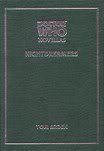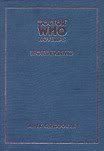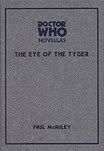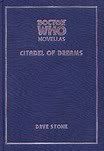5 Doctor Who novellas
David Howe's Telos Publishing produced fifteen in hardback between 2001 and 2004, before the BBC declined to renew their licence. So far I've been very pleasantly surprised in finding most of them to be of a very high standard, though they are probably considered 'non-canon'. More's the pity. Here are four I recommend, and one I don't.

Tom Arden, Nightdreamers, 2003
Fantasy author Tom Arden gives a Shakepearean twist to Who lore with a comedy of errors (of sorts) that uses A Midsummer Night's Dream as a template. He captures the essence and humour of that play particularly well, along with the somewhat bumbling nature of the Third Doctor, who for Arden was always the definitive one. With the drama taking place in a medieval human setting on the forested moon of a planet known as Galaxis Bright, the Doctor and his companion Jo find themselves embroiled in a court intrigue surrounding the forthcoming marriage of a princess, as well as getting to the bottom of the mystery of the enigmatic Nightdreamers of folklore who have long frightened the lives of the local population. Well written and well paced, and sprinkled with at least two very good Who in-jokes.

Jonathan Blum & Kate Orman, Fallen Gods, 2003
Storm Constantine says in her introduction, "Fallen Gods has been a revelation to me; it has opened my eyes to the modern world of Doctor Who". Certainly this is a far-reaching work in terms of storytelling style, an unusually heady and convincing mix of historical, mythological and fantastical threads. Set in the time of the war between Akrotiri and Athens in ancient Greek times, in a magical opening scene the Doctor first teaches a young Akrotiri woman how to fly, then uses her to unravel the mystery of the flaming bulls that are descending from the sky to destroy Akrotiri. However, after initiating events things begin to spin far beyond the Doctor's control, leaving him a small and diminished player in the complex relationship between men and their vengeful gods who inhabit Akrotiri's nearby volcano. Fallen Gods picked up the 2003 'Best Novel' Aurealis Award for Australian Speculative Fiction, and somehow I am not in the least bit surprised as this is so richly layered it almost demands a second reading. Certainly one of the best books I've read this year.

Mark Chadbourn, Wonderland, 2003
The second Doctor is in San Francisco in 1967, caught up in the linked mysteries of strange disappearances, a curious alien captive, and the strange pills known as Blue Moonbeams. Told through the experiences of a idealist hippie who becomes caught up in a very sinister side to the peace movement, this is surely as close as the Doctor ever got to a world of sex and drugs and rock and roll, all of which have the right prominence to give the story a strong sense of time and place. The Doctor is noticeably remote and uninvolved for much of the duration, but this uncharacteristic behaviour is a subtlety that Chadbourn is clever enough to turn into one of the story's strengths. The conspiracy element works well and the politics are notably pacifist, but in spite of the fairly standard Who plot it is the detailed and convincing context that Chadbourn provides that makes this impressive.

Paul McAuley, The Eye of the Tyger, 2003
The eighth Doctor finds himself in 1920s British India, tracking down a tiger-like beast that is more than it first appears, before the story suddenly transforms itself into a generation starship tale. Neil Gaiman’s introduction is what is needed to give a bit of weight to this story which, compared to the breadth McAuley usually achieves in his novels, possibly reads too thin and lightweight. The story’s narrator, the Doctor’s companion Edward Fyne, provides a believable 1920s steampunk viewpoint (ie. he’s emphatically pre-post-modern) and he’s by far the most engaging aspect of the book. McAuley is clearly coasting here, but having fun with an undemanding plot that sometimes goes too far, too fast.

Dave Stone, Citadel of Dreams, 2002
On a far-off planet towards the centre of the galaxy, a street urchin by the name of Joey lives hand to mouth in the colony town of Hokesh. Discovering he has a knack for precognition and mind-reading, his talent gets him into as much trouble as it gets him out of. Enter, stage right, the seventh Doctor, who mostly lurks in the background while events and characters play themselves out regarding a series of bizarre deaths and their connection to the rulers of the city. Citadel of Dreams has a slowburn kind of build, with events only half-seen through an obscuring prism of strange identities, mystery and unreality. Half-way into the book I was beginning to doubt that this tangle of knots could possibly resolve itself satisfactorily, so twisted were the few threads becoming and all told with an arcane language that, in part, Dave Stone requires the reader to decipher. Then along comes Ace, with her usual straightforward earthiness to sort out matters and somehow set the stage for the Doctor to resolve this complex story, with everything then becoming a whole lot clearer. Stone makes concise use of Ace and the Doctor's best traits in a deliberately unsettling narrative, so I have a healthy respect for this technically accomplished piece of writing despite its trickery. On the strength of this book I'll certainly be seeking out Stone's other Who titles.

Tom Arden, Nightdreamers, 2003
Fantasy author Tom Arden gives a Shakepearean twist to Who lore with a comedy of errors (of sorts) that uses A Midsummer Night's Dream as a template. He captures the essence and humour of that play particularly well, along with the somewhat bumbling nature of the Third Doctor, who for Arden was always the definitive one. With the drama taking place in a medieval human setting on the forested moon of a planet known as Galaxis Bright, the Doctor and his companion Jo find themselves embroiled in a court intrigue surrounding the forthcoming marriage of a princess, as well as getting to the bottom of the mystery of the enigmatic Nightdreamers of folklore who have long frightened the lives of the local population. Well written and well paced, and sprinkled with at least two very good Who in-jokes.

Jonathan Blum & Kate Orman, Fallen Gods, 2003
Storm Constantine says in her introduction, "Fallen Gods has been a revelation to me; it has opened my eyes to the modern world of Doctor Who". Certainly this is a far-reaching work in terms of storytelling style, an unusually heady and convincing mix of historical, mythological and fantastical threads. Set in the time of the war between Akrotiri and Athens in ancient Greek times, in a magical opening scene the Doctor first teaches a young Akrotiri woman how to fly, then uses her to unravel the mystery of the flaming bulls that are descending from the sky to destroy Akrotiri. However, after initiating events things begin to spin far beyond the Doctor's control, leaving him a small and diminished player in the complex relationship between men and their vengeful gods who inhabit Akrotiri's nearby volcano. Fallen Gods picked up the 2003 'Best Novel' Aurealis Award for Australian Speculative Fiction, and somehow I am not in the least bit surprised as this is so richly layered it almost demands a second reading. Certainly one of the best books I've read this year.

Mark Chadbourn, Wonderland, 2003
The second Doctor is in San Francisco in 1967, caught up in the linked mysteries of strange disappearances, a curious alien captive, and the strange pills known as Blue Moonbeams. Told through the experiences of a idealist hippie who becomes caught up in a very sinister side to the peace movement, this is surely as close as the Doctor ever got to a world of sex and drugs and rock and roll, all of which have the right prominence to give the story a strong sense of time and place. The Doctor is noticeably remote and uninvolved for much of the duration, but this uncharacteristic behaviour is a subtlety that Chadbourn is clever enough to turn into one of the story's strengths. The conspiracy element works well and the politics are notably pacifist, but in spite of the fairly standard Who plot it is the detailed and convincing context that Chadbourn provides that makes this impressive.

Paul McAuley, The Eye of the Tyger, 2003
The eighth Doctor finds himself in 1920s British India, tracking down a tiger-like beast that is more than it first appears, before the story suddenly transforms itself into a generation starship tale. Neil Gaiman’s introduction is what is needed to give a bit of weight to this story which, compared to the breadth McAuley usually achieves in his novels, possibly reads too thin and lightweight. The story’s narrator, the Doctor’s companion Edward Fyne, provides a believable 1920s steampunk viewpoint (ie. he’s emphatically pre-post-modern) and he’s by far the most engaging aspect of the book. McAuley is clearly coasting here, but having fun with an undemanding plot that sometimes goes too far, too fast.

Dave Stone, Citadel of Dreams, 2002
On a far-off planet towards the centre of the galaxy, a street urchin by the name of Joey lives hand to mouth in the colony town of Hokesh. Discovering he has a knack for precognition and mind-reading, his talent gets him into as much trouble as it gets him out of. Enter, stage right, the seventh Doctor, who mostly lurks in the background while events and characters play themselves out regarding a series of bizarre deaths and their connection to the rulers of the city. Citadel of Dreams has a slowburn kind of build, with events only half-seen through an obscuring prism of strange identities, mystery and unreality. Half-way into the book I was beginning to doubt that this tangle of knots could possibly resolve itself satisfactorily, so twisted were the few threads becoming and all told with an arcane language that, in part, Dave Stone requires the reader to decipher. Then along comes Ace, with her usual straightforward earthiness to sort out matters and somehow set the stage for the Doctor to resolve this complex story, with everything then becoming a whole lot clearer. Stone makes concise use of Ace and the Doctor's best traits in a deliberately unsettling narrative, so I have a healthy respect for this technically accomplished piece of writing despite its trickery. On the strength of this book I'll certainly be seeking out Stone's other Who titles.